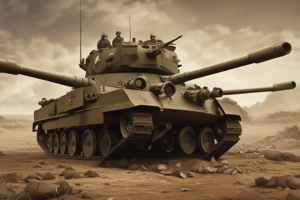Podcast
Questions and Answers
What event sparked the beginning of World War I?
What event sparked the beginning of World War I?
- The signing of the Treaty of Versailles
- The German invasion of Poland
- The invasion of Serbia by Austria-Hungary
- The assassination of Archduke Franz Ferdinand (correct)
Which term is used to describe the mode of warfare characterized by fixed defensive lines and little mobility in World War I?
Which term is used to describe the mode of warfare characterized by fixed defensive lines and little mobility in World War I?
- Total warfare
- Trench warfare (correct)
- Blitzkrieg warfare
- Guerrilla warfare
Which treaty marked the end of World War I and imposed heavy reparations on Germany?
Which treaty marked the end of World War I and imposed heavy reparations on Germany?
- Treaty of Brest-Litovsk
- Treaty of Versailles (correct)
- Treaty of Trianon
- Treaty of Saint-Germain-en-Laye
Which conflict began with the invasion of Poland by Germany?
Which conflict began with the invasion of Poland by Germany?
What was a significant development of World War II?
What was a significant development of World War II?
What significant event marked the end of several European empires during World Wars I and II?
What significant event marked the end of several European empires during World Wars I and II?
Which organization was established in response to the devastation caused by the world wars?
Which organization was established in response to the devastation caused by the world wars?
What conflict arose between Western powers and the Soviet Union as a result of World War II?
What conflict arose between Western powers and the Soviet Union as a result of World War II?
Which two significant developments occurred during World War II according to the text?
Which two significant developments occurred during World War II according to the text?
In what year did the United Nations come into existence following World War II?
In what year did the United Nations come into existence following World War II?
Flashcards are hidden until you start studying
Study Notes
World Wars: A Comprehensive Overview
The 20th century witnessed two cataclysmic conflicts that shook the foundations of the world: World War I (1914-1918) and World War II (1939-1945). These wars left innumerable casualties, reshaped the political landscape, and forever changed the course of global history.
World War I
Known as the "Great War" or "The War to End All Wars," World War I was ignited by a series of events in the Balkans—the assassination of Archduke Franz Ferdinand of Austria-Hungary and the declaration of war by Austria-Hungary on Serbia. The conflict initially involved just a handful of European nations but quickly expanded, drawing in the United States, Canada, and Australia later in the war.
Fought largely in Europe, the conflict was characterized by the introduction of new weapons, including machine guns, tanks, and chemical warfare. One of the most significant developments of the war was the system of trench warfare, which drastically limited the mobility of armies, resulting in massive casualties and stalemates.
The war ended with the Treaty of Versailles, which imposed heavy reparations on Germany, carved up the Austro-Hungarian and Ottoman empires, and established the League of Nations in an attempt to maintain peace.
World War II
World War II began with the invasion of Poland by Germany in 1939. The conflict, which involved most of the world's great powers, was marked by unprecedented brutality and human suffering. The war was characterized by its global scope and the involvement of multiple theaters, including Europe, North Africa, Asia, and the Pacific.
The war saw the rise of fascism and the fall of many European empires. Two of the most significant developments of World War II were the Holocaust, the systematic murder of millions of Jewish people by the Nazi regime, and the use of atomic weapons by the United States against Japan.
The war ended with the surrender of Germany and Japan in 1945. In the aftermath of the war, the United Nations was created to replace the League of Nations, and the Cold War began between the Western powers and the Soviet Union.
Consequences
World Wars I and II fundamentally altered the world order and had far-reaching consequences. Some of the most significant consequences include:
- The rise and fall of empires: Both world wars marked the end of several European empires, including the Austro-Hungarian, Ottoman, and Russian Empires, and the beginning of the British, French, and Japanese empires' decline.
- The creation of the United Nations and the League of Nations: These organizations were established in response to the devastation caused by the world wars, with the aim of promoting peace and security among nations.
- The establishment of the state of Israel: The Holocaust and the failure of the League of Nations to prevent it led to the establishment of the state of Israel in 1948.
- The Cold War: World War II set the stage for the Cold War, a conflict between the Western powers and the Soviet Union that lasted from 1947 to 1991.
World Wars I and II continue to shape our world, serving as a stark reminder of the devastation caused by conflict and the need for peace and cooperation among nations. Today, we must remember the lessons of these wars and work towards a more just and peaceful world.
Studying That Suits You
Use AI to generate personalized quizzes and flashcards to suit your learning preferences.




